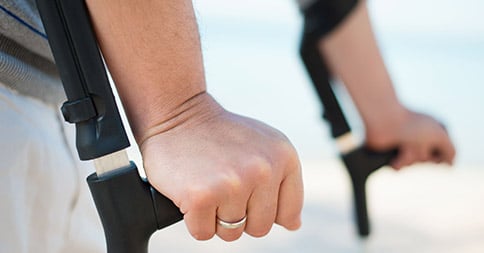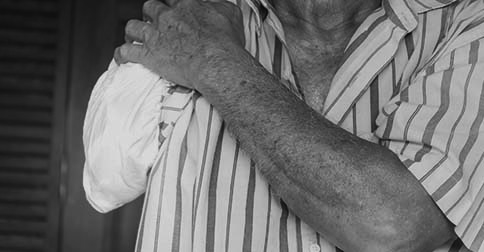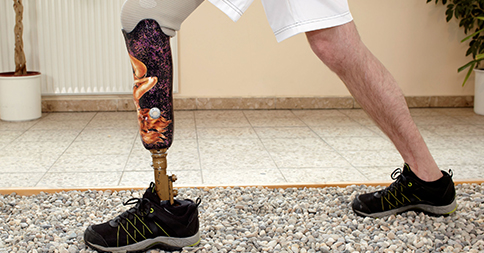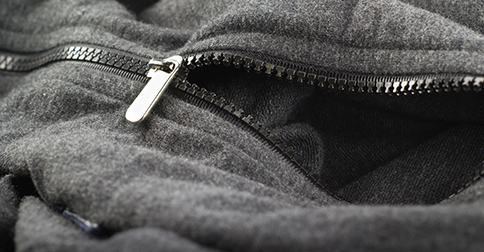There are many concerns when dealing with pregnancy, and having a prosthesis can add a couple more. While many people go through this particular situation, there is not an excess of information available about it -- so we wanted to provide some answers. Read on!
Pregnancy
A major concern is your prosthesis fitting properly as you gain weight later in the pregnancy. This can lead to a tight socket, which causes sores and cuts. It is important to meet with your prosthetist to discuss the best option for you.
Having a socket made of flexible material, like the BioTech Comfort Socket System, that can adapt to your body throughout the pregnancy is crucial and should be a top priority. If you have a hard time finding this or you are not comfortable in your socket, talk to your prosthetist about getting a larger socket. It may be a bit too big at first, but find one that you will grow into later in the pregnancy. In some situations, you may not feel comfortable wearing your prosthesis in the last few months. If this happens, then crutches or a wheelchair can be used for transportation.
Childbirth
Preparing for the actual moment of childbirth can feel overwhelming, but it is important to remember to stay calm and collected. You can choose whether or not to wear your prosthesis. Many people choose not to so as to keep their prosthesis and liner clean, but you should do whatever makes you feel more relaxed.
You can always clean your prosthesis afterwards, if that is what feels best. If you are worried about your residual limb being in pain or a doctor/nurse accidentally hitting a sensitive spot, ask to have a loved one hold your leg. If they do not already know your sensitive areas, make sure to communicate with them before.
Motherhood
Becoming a parent while having a prosthesis can be nerve-wracking at times. Baths, car rides, and changing diapers can be overly difficult if you are not prepared. It helps to get creative with the supplies around you. While changing diapers, for example, find a way to keep your child’s feet up. This could be with cloth or another device that allows you to focus on the cleaning and changing process. When it comes to baths, it may help to find a specialized chair that allows the baby to sit in the water while you wash.
Let BioTech Help You Prepare!
If you are nervous about your pregnancy and parenthood, let us know and we will help find the right equipment and classes for you. This is an exciting time, and while being prepared is important, you must remember that you have the support and strength to excel and begin raising your family! Contact us today for more information.
If you’re headed to the beach for the first time after limb loss, you may be wondering if there are certain things you should and shouldn’t do regarding your prosthetic device. The short answer is, yes – there are definitely special considerations to be made as an amputee at the beach! Read on to learn some tips for a beach trip that’s safe and fun.
Tip #1: Don’t Leave Your Prosthesis in the Car
If you’re driving from your condo to the beach access point, you may be tempted to just leave your prosthesis in the backseat for safekeeping. However, a prosthesis that’s left in a car can get too hot, which can cause the plastic to melt and warp. You don’t want that!
Tip #2: Know How to Use a Prosthesis in the Water
First of all, there are some prostheses that are actually designed to be used in water. After you use one, though, be sure you turn it upside down when you rinse it out because sand and water can get trapped inside. There are also protective covers that you can use on your regular prosthesis to keep it dry, even when it’s completely submerged.
Also, another tip: some prosthetic devices float in the water!
Tip #3: Be Careful with Forearm Crutches
If you’re using forearm crutches at the beach, be aware that they are hollow and can easily fill up with sand and/or water. Also, if part of your crutches are metal ( this really goes for all prosthetic devices), then remember the danger of rust. If your device is exposed to salt water, you need to rinse and dry them well so that they don’t rust.
Let BioTech Help You Recognize Your Possibilities!
We’re committed to helping all of our patients live full, exciting, adventurous lives – and that includes you! If you’re looking for a prosthetist who will help you with everything from the fit of your prosthesis to getting back to your old hobbies, look no further than BioTech. Contact us today to learn more!
An amputation is a huge life change. When you’re looking toward the day when you become an amputee, it can feel like nothing makes sense anymore – how are you supposed to live a normal life without all of your limbs? What will life be like? What can you do to adjust?
We’ve got five things everyone should know before they go in for their amputation. Read on!
#1: People Stare Because They Are Curious
You’re probably going to feel like everyone is looking at you after your amputation. The truth is that a lot of people will be looking at you – but not because they are judging you or making fun of you! They’re just curious, wondering what your story is, and for a moment they have forgotten that staring tends to make people uncomfortable.
If you want to, it’s sometimes fun to come up with a short (probably false) explanation for your limb loss. Simply barking the words “shark attack” at a person whose stare lingers too long can really relieve the tension! (Unless it really was a shark attack, in which case, it’s your call if you want to be honest or not!)
#2: Beware the Internet
As if there weren’t enough reasons to approach the Internet cautiously, now that you’re going to be an amputee, you’ve got people who range from antagonistic to way too interested about your amputation, trolling you on social media. The block button is your friend; use it liberally.
#3: Get an Amazing Prosthetist
The person who helps you adjust to a prosthetic device can be your greatest asset or a huge obstacle. And believe us, the last thing you need after amputation is another challenge in your life! Make sure your prosthetist listens well, thinks outside the box, and is as invested in your emotional wellbeing as he or she is in your physical recovery.
#4: It Is Possible to Overdose on Inspiration
We love inspiring stories and the amazing people behind them – but sometimes, it can start to feel like everyone but you is a Paralympic athlete / can drive a car with their toes / is a reality TV star, etc. If the inspiring stories get to be a little too much, just stop looking for a while. Focus on your story, not theirs. After all, your story is every bit as incredible as anyone else’s – it just might not look the same!
#5: You Can Be Active Without Being an Athlete
Speaking of inspiring stories, most of them are about athletes (though we did find some pretty incredible politicians, too). So if you’re not an athlete, how can you still be active? Good news – there are plenty of ways! Dancing, walking, doing basic exercises while you watch TV, or just flailing around and being silly – these are all great ways to get your blood pumping. You don’t need to be jumping hurdles with a leg prosthesis in order to be an in-shape amputee!
BioTech Is Here – Before and After Amputation
Feeling uncertain about life after amputation? We get it, and we’re here to talk you through every step of your journey. Contact us today for more information on our services and how we can help you recognize all your possibilities as a person with limb loss!
If you’ve recovered from your lower-extremity limb loss to the point that you’re moving pretty well and you have a decent range of motion, you may be ready to try some exercises that will help you build strength. As always, before you start any kind of exercise program, you should talk with your doctor and your prosthetist to determine whether you are ready for something like this. You don’t want to rush it – but if your body is ready, it can be a great way to start feeling more normal!
Read on to learn about some exercises you can do after lower-extremity limb loss.
Seated Push-Up
Put a sturdy chair against a wall so that it won’t tip over. Sit in the chair and place your hands on the armrests. Push down onto the armrests, raise your hips a couple of inches off of the seat, and then bring yourself back down. For more of a challenge, lift one leg during the exercise.
Partial Squats
While holding on to something sturdy, distribute your weight evenly onto both legs, and squat as if you were sitting on a tall stool. Don’t try to do a full squat – just a partial one. Repeat 10 times. Strengthening the thigh muscles will make it easier to sit and rise from a chair.
Pelvic Tilt
Lying on your back, with or without your prosthesis, bend your hips and knees to a 90 degree angle. Place your hands just above your knees, and press down with your stomach muscles to flatten the small of your back. Keep your thighs still. Hold steady for two to three seconds, breathing normally. This move strengthens the abdominal muscles (stomach). For more of a challenge, lift your head.
Even Weight Bearing
Think about how much weight you have on each leg. Many people with limb loss put all of their weight onto the unaffected leg, using the prosthesis as a crutch. Make an effort to stand with your weight evenly on both legs while you perform one daily task, such as talking on the phone or making coffee. By being aware and changing this one habit, you can make improvements in your balance on a daily basis.
Braiding
Using a sturdy piece of furniture for balance assistance, take a few steps to one side, crossing your prosthetic leg in front of, and then behind, your unaffected leg. Stand up as straight as possible and use your hands only for balance, if you can. If your amputation is above the knee, stick with small steps so that you don’t put too much weight on the toe of your prosthesis. This could cause the knee to bend.
BioTech Is Here for You!
Whether you need help with a fitting or advice for after-amputation care, BioTech is here to help. Contact us today for all your prosthetic needs!
Almost everyone experiences some type of “blues” during the winter months. This can be related to the holidays, the shorter days, or the gloomier weather – but hardly anyone is immune! For a new amputee, though, these already difficult months can feel even harder than usual. What are these emotions, and how can you deal with them?
Look for Symptoms
The first thing to do is look for signs that you are experiencing some form of depression. These symptoms may include:
- Changes in appetite or eating patterns
- Low energy levels
- Changes in sleeping patterns
- Poor concentration
- Decreased interest or enjoyment of activities you used to like
- Loss of interest in sex
- Withdrawal from friends and family
- Feelings of hopelessness, unreasonable guilt, or worthlessness
- Emotions expressed without genuine feeling
If you are experiencing any of these symptoms, it’s possible that you are dealing with depression, which may be compounded by the winter season.
How to Deal with Winter Depression
Physically speaking, there are certain things you can do to make the season easier for you. Get plenty of rest, make a point to get out of bed and get dressed every day (and leave the house if possible), and eat healthy foods that won’t give you a sugar crash. Do whatever kinds of exercises you are able to do without pain – get those endorphins running! Avoid alcohol and any other drugs that you don’t absolutely need for medical reasons. And whatever you do like about yourself – now is the time to really focus on those things!
Emotionally, it’s important that you tell someone how you are feeling, and let them remind you that you’re not alone. This may be a licensed counselor or a trusted friend, but you need a confidant. Spend time doing things that bring you some amount of joy, like watching a movie or getting takeout from your favorite restaurant. You don’t need to try to force yourself to “be happy.” Take a little while to do what you need to do in order to feel better. You can also contact an Amputee Coalition Support Group. If you’re not sure where to find one, contact the Amputee Coalition office toll-free at 1-888-AMP-KNOW for information and help.
Mentally, try to avoid making big decisions during this time. Make a commitment to working with your medical professionals, even when you don’t feel like it, so that they can help get you back to feeling normal. Speak positively instead of negatively about yourself and your body. You may not believe what you’re saying right now, but you can change your thought patterns – and it starts with deciding to change them. If needed, consult a psychotherapist to help you with this.
You’re Not Alone!
Here at BioTech, we’re so much more than just a prosthetics and orthotics company. We love our patients like family, and if you need some friendly advice to help you get through the winter, we are more than happy to help. Contact us today for more information!
After you’ve lost a limb, your old clothes may not work as well anymore. Even if they still fit, it may be far too labor intensive for you to maneuver them over a prosthetic device, fasten a lot of buttons, or to reach as far as you need to in order to get something on! So what can you do? The answer lies in adaptive clothing, which is clothing and footwear designed specifically for people who may have a restricted range of motion or otherwise have difficulty dressing themselves.
What Is Adaptive Clothing?
Designed for post-surgery individuals, people with disabilities, elderly people, children and adults with developmental delays, people with arthritis, and – of course – people with limb loss, adaptive clothing is meant to make the dressing process easier and smoother. It provides easy access to specific body parts without requiring the complete removal of the garment, saving its wearer a lot of time and energy.
Adaptive clothing comes in a variety of styles and with a wide range of medical purposes in mind. Most of them have zippers that make it easy to access a body part without removing the clothing, allowing the person wearing the garment to maintain a certain level of independence. Additionally, it allows for fast access to medical devices (such as a prosthesis) for both the patient and a nurse or caregiver.
What Options Are Available?
Among the many different forms adaptive clothing can take, you will find:
- Velcro or snap closures (as opposed to buttons)
- Front-closing bras
- Wrap-around skirts
- Zippers located conveniently in the front
- Open-back clothing
- Shoes with Velcro
- Side-opening pants
- Designs that allow dressing while seated
Important Qualities for Your Adaptive Clothing
When shopping for adaptive clothing, it’s important to keep a few things in mind. First, you don’t want something that’s going to feel abrasive or irritating. Secondly, make sure that the design allows you to stay modest and dignified! With wrap-around items in particular, you want a generous amount of overlap, and – if you are in a wheelchair – a high-backed garment.
Make sure you check the location of fasteners. You don’t want an excessive amount of pressure to be applied to a sore or tender area, because this can produce sores, which can get infected. Also look for high-quality fabrics that will stand up to a rigorous usage and cleaning schedule so that you don’t end up with a fraying or stretched-out garment!
More Questions? BioTech Is Here!
Whether you’re interested in adaptive clothing or you’ve got questions about post-op care, BioTech is here to help. Contact us today and let us take great care of you!
The holidays are here, and gift season is in full swing! It can be challenging to find the perfect gift for everyone in your life, though – especially when you’ve got a friend or relative who has recently lost a limb. Luckily, BioTech is here with some great, fresh ideas for gifts for amputees, and we’ve divided them into “serious gifts” and “funny gifts” (because everyone feels differently about their limb loss, so you might need a wide variety of options!). Read on!
Serious Gifts for Amputees
This hand prosthesis patent print could make for some interesting, personal art in your friend or relative’s home. It’s unique and historical, not to mention extremely low cost!
One thing you might not consider as a gift (or at least, as part of a gift) is baby wipes. They come in handy when it comes to cleaning a residual limb or liner. When someone with limb loss is out and about, they may want to take off their prosthesis for a little while – but they know that if they do, they’ll need to wipe down their residual limb before they put it back on. Having wipes on hand can be super convenient!
Another great product is AmpuBalm, which can be especially helpful to someone who is in their first 6 months of recovery. For protecting skin and creating a barrier between the residual limb and the socket, AmpuBalm is one of the best options on the market – but it can also be hard to find, so if you get some for your loved one, you’re probably helping them out a lot!
We also love this Amputee Awareness keychain, which could help the person remember that you are thinking of them every time they look at it!
This leg prosthesis patent mug could be a cool gift for the coffee lover in your life. They’ll probably be the only one at the office with a mug like this!
Finally, there’s Noah Galloway’s new book. He’s an inspiring person who might help your loved one remember that their life is still full of possibilities. If your friend or family member is a bookworm – or they just love Noah (and who doesn’t?) – this might be the perfect choice!
Funny Gifts for Amputees
If your loved one has demonstrated a sense of humor about their limb loss, a funny or clever gift might be right up their alley.
Café Press has lots of t-shirts with limb loss-related witticisms, and we think some of them are pretty funny (especially the one that says “Leg Story: $10”). You can also get drinkware, wall art, and jewelry with amputee humor!
Before you purchase anything humorous for your loved one with limb loss, make sure they are ready to make light of their situation. The last thing you want to do is appear to be making fun of them, so unless you are 100% confident that they will appreciate the joke, stick with one of the more serious options!
Call BioTech for Dedicated, Personalized Service
When it comes to caring for people with limb loss, nobody does it better than BioTech. Give us a call today for all your prosthetic and orthotic needs!
Halloween is approaching, and with it, the question of costumes. If you’re new to limb loss, you may be tempted to skip out on the festivities this year – but there’s no need for that! Losing a limb (or two, or more) just means your costume options have changed. Read on for three great Halloween costumes for people with limb loss!
#1: The Black Knight from Monty Python and the Holy Grail
This is definitely the most versatile option on our list, given that the Black Knight goes through a series of limb losses during his fight scene. No matter how many limbs you’re missing, you can be the Black Knight – even as a quadruple amputee!
Buy or make a black helmet that covers your entire head (including your face!), fashion a suit of armor out of a black tunic and some leggings, add a red dragon on the front, and play up your missing limb with some red paint. Assure everyone around you that it’s “only a flesh wound,” and your costume is complete!
#2: The Leg Lamp from A Christmas Story
Even if you’ve never seen the movie, you’ve probably seen the leg lamp somewhere. This one will require the use of crutches or a cane, though, because you’ll have to leave your leg prosthesis at home!
You’ll need a fishnet stocking, a black high heel, and a lampshade with black fringe around the bottom edge. Rig the lampshade so that it stays around your thigh, and wear plain clothing up top so as not to distract from the genius of your costume! Bonus points for every time you refer to your leg lamp as “fra-GEE-lay.”
#3: Dr. Arliss Loveless from Wild Wild West
Here’s a unique option for wheelchair users, especially double leg amputees. According to villians.wikia.com, Dr. Loveless is “an evil genius who was once part of the Confederate army during the American Civil War and the founder and leader of the Loveless Alliance.” He’s a major villain who seeks to overthrow the United States government and divide it up among himself and his villain friends.
For this costume, think steampunk: top hat, round glasses (dark, preferably), black clothing, and a steam-powered wheelchair.
Embrace Your Possibilities with BioTech!
Here at BioTech, we know that losing a limb is challenging – but that doesn’t mean you should stop having fun! Take advantage of Halloween this year, and dress up like something you couldn’t have pulled off before your limb loss.
And remember, we’re here to help you with all your prosthetic and orthotic needs. Contact us with any questions you have – we’re always happy to help!
Is it just us, or does the air feel a little crisper than usual? Hooray – it’s fall! Here in beautiful Alabama, one of our favorite ways to enjoy the season (besides football games, hot chocolate, and pumpkin spice everything) is to take a long hike through the golden-orange woods. Read on for tips about hiking with a prosthesis!
Make Preparations
Before you set off down your favorite trail, make sure you talk to your prosthetist about your plans. You’ll probably want to stop by and have them check the fit of your prosthesis, as well as ensure that everything is working the way it should be.
It’s also good to be certain that your prosthesis can withstand the activity you’re about to participate in; some are made to hold up under tougher conditions than others, so a pre-hike prosthesis checkup is definitely in order!
Supplies for Hiking with a Prosthesis
Depending on your amputation and your level of physical fitness, you may want to wear or bring the following things:
- Appropriate Footwear. Supportive, lightweight shoes are a must for hiking! If you are a leg amputee, your sound limb will endure a lot of shock during your hike, and a good shoe can help absorb some of that shock.
- Chafe Guard or Barrier Cream. With temperature increase and sweat production comes friction, and even if your socket fits perfectly during everyday activities, hiking can create new pressure points due to the uneven terrain.
- Adjustable Trekking Poles. These can help with balance (which can be tricky, given all the roots and rocks in your way!) and with power/braking assistance as you go up and down hills.
- A Multi-tool with Allen Wrenches. Ordinarily, we really do not advise you to adjust your prosthesis on your own – but if a bolt works its way loose on the trail, the ability to tighten it up might be the only way you can walk (as opposed to hop) back to your car!
- A Friend. While a solitary walk in the woods might sound appealing, the last thing you need is for something to happen that leaves you stranded – alone. Choose wisely and take a friend along. After all, a hike is more fun when you share it with someone else!
Need Advice? Call BioTech!
Here at BioTech Limb and Brace, we specialize in answering questions and meeting needs. Limb loss is a life-changing experience, but it certainly doesn’t have to mean that the fun’s over! Contact us if you’re looking for ways to recognize all your new possibilities. We’re always here to help!









